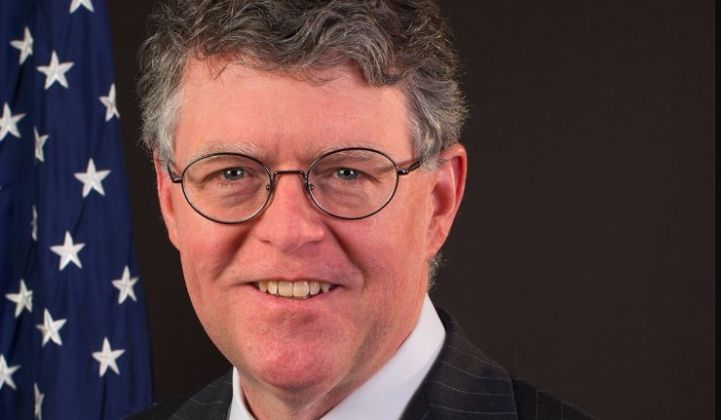Bernard McNamee, the Trump-appointed commissioner at the Federal Energy Regulatory Commission who has voted to restrict clean energy in key grid regulatory decisions, has announced he will leave after his term ends in June — unless his departure leaves FERC without a quorum.
McNamee’s announcement came during FERC’s Thursday meeting. McNamee cited personal reasons for the decision, saying, “I love this job, but I love this family more.”
McNamee said he intends to remain at FERC through the end of his term, however, and won’t leave the position until his replacement is picked. That’s because his departure would otherwise leave FERC with only two commissioners, Republican Chairman Neil Chatterjee and Democrat Richard Glick. FERC lost its quorum through much of 2017, leaving the agency unable to vote on key decisions for interstate electricity transmission and natural-gas projects.
The Trump administration has failed to fill the seats left by the death of Chairman Kevin McIntyre and the departure of Commissioner Cheryl LaFleur. James Danly, the current FERC general counsel nominated in October to fill McIntyre’s seat, saw his nomination returned from the Senate to the White House earlier this month, and no replacement nominations have since been announced.
Chatterjee said at Thursday’s meeting that it’s “entirely possible” that McNamee will continue to serve on FERC while the Senate awaits nominees to fill the remaining seats. The White House has drawn criticism from Democrats in Congress for failing to “pair” Danly’s nomination as a Republican with a Democratic nominee, a break with precedent.
McNamee, a Texas attorney for conservative groups and noted critic of clean energy, was nominated in October 2018 to replace outgoing commissioner Ron Powelson. He was approved by the Senate in December 2018, despite broad opposition from environmental and clean energy groups for his record of disparaging renewable energy as being incompatible with a reliable grid, as well as his work on deregulation policy for conservative groups and as an attorney for Sen. Ted Cruz (R-Texas).
While serving as the Energy Department’s deputy general counsel for energy policy, McNamee helped craft Energy Secretary Rick Perry’s plan for FERC to require coal and nuclear power plants to be propped up by out-of-market payments as grid reliability assets. After the five members of FERC unanimously rejected that plan, McNamee, then head of DOE’s Office of Policy, continued to publicly defend a Trump administration plan to use national emergency designations to keep power plants open.
McNamee has voted with Chatterjee, and over the objections of Democratic Commissioners Glick and LaFleur, on several decisions over the past year. The most momentous was last month’s order for mid-Atlantic grid operator PJM to assign administratively determined price floors to all new renewable energy, demand response, energy efficiency and other non-fossil-fuel-fired resources.
Critics say the policy will price renewable energy out of the market, create confusion and legal challenges, cost customers of utilities served by PJM billions of dollars a year in unnecessary costs, and undermine state clean energy goals across PJM’s 13-state service territory. Commissioner Glick, FERC’s lone Democratic commissioner, excoriated the decision in a 16-page dissent, calling it a violation of states’ jurisdiction over setting their own energy policy, as well as FERC’s own rules against “arbitrary and capricious” policymaking.




